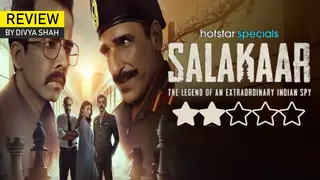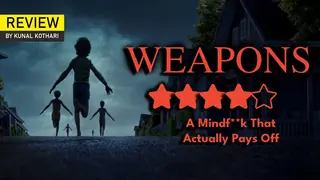Haq Review: Yami Gautam Roars in Her Most Fearless and Gripping Story Yet
Haq isn’t just something you watch. It becomes an experience that sits in your chest long after the screen fades. You walk with Shazia. You ache with her.
Published: Wednesday,Nov 05, 2025 05:00 AM GMT+05:30

In theaters now
Cast: Emraan Hashmi, Yami Gautam, Sheeba Chadha, Vartika Singh, Danish Hussain & more
Directed by: Suparn S Varma
Rating - 3.5 stars
Some films arrive like storms. They don’t ask for permission. They don’t whisper. They crash through the noise and demand you to look, listen, and feel. Haq does exactly that. Set in India of the late seventies and mid-eighties, the film follows Shazia Bano, a woman whose simple wish for dignity pulls her into a legal battle she never imagined she’d have to fight. Her story begins quietly: a young bride entering Abbas Khan’s home, unaware that the biggest battles of her life are waiting on the other side of that door. What plays out next is a deeply personal struggle that evolves into a national conversation on faith, accountability, and the meaning of justice. The magic of Haq is that it never tries to preach. It simply lets Shazia’s truth speak.
A Woman Against a System

When Abbas stops providing for their children after taking a second wife, Shazia does what most women of her time never dared: she takes him to court. This one decision shakes up their community and exposes the cracks within a world where religious interpretation is often controlled by self-appointed guardians.
The film leans heavily on the idea that " Quran rakhne, padhne aur sammajhne mein boht farak hai", as said by Shazia. Through her journey, we see how easily rules can be twisted, and how quietly women are expected to suffer in the name of tradition. When Abbas hurls triple talaq at her in a moment of arrogance and fear, it becomes clear that her fight is no longer only about child support. It becomes about reclaiming a voice that some men believe they can silence with three words.
Haq takes inspiration from the real Shah Bano case, but instead of feeling like a history lesson, it becomes an emotional plunge into a woman’s lived experience. You feel her heartbreak. You feel her anger. You feel her hope. And slowly, piece by piece, her story becomes yours.
Suparn Varma at His Boldest

Suparn Varma approaches the film with the confidence of someone who knows exactly what he wants to say. He doesn’t soften the edges of this world. He doesn’t dilute its discomfort. Instead, he lets the camera walk right into the fire. One of the boldest choices he makes is refusing to turn Haq into a “community commentary” spectacle. The focus stays firmly on Shazia, not on scoring political points. Even when the film shows the hypocrisy of certain qazis or the silence of men who benefit from broken systems, it never reduces them into caricatures. Varma treats even the antagonists with complexity, which makes the story far more compelling.
The pacing is deliberate. The first half spends time building Shazia’s inner world, her tenderness, her fear, her small joys, her growing frustration. This slow simmer pays off beautifully when the second half erupts into a courtroom drama that feels sharp, grounded, and deeply human.
Screenplay: Precision Wrapped in Emotion

Reshu Nath’s writing gives Haq its spine. The screenplay jumps across nearly ten years, showing how the case moves through the courts while Shazia tries to hold her family together. Each time the year flashes on the screen, you feel the weight of time slipping from her hands. Children grow up. Hopes rise and fall. Lives are reshaped by legal delays.
The courtroom sequences are exceptional. No unnecessary melodrama. No thundering background score trying to manipulate emotions. Instead, we get crisp arguments, meaningful silences, and dialogues that stick long after the scene ends. One of the lines that hits hardest is when Shazia says her children now mark their memories by court dates. It’s a quiet moment, but it cuts straight through you.
Dialogue: Sharp Enough to Leave Bruises

The dialogues in Haq are not written for applause, yet you feel like clapping anyway. They’re honest. They’re layered. They’re rooted in reality. When Shazia says, “Kabhi Kabhi sirf mohabbat kaafi nahi hai, hume izzat bhi chaiye” you can feel the entire film shifting around those words.
When her father steps forward and reminds everyone, “Yeh meri beti hai, aur iska naam Shazia hai,” it becomes a moment of simple, unshakeable pride. And then there’s Abbas. His sharp remark to his second wife “Apne khayal personal diary mein likh lo”, captures his character in one stroke: cold, dismissive, and so used to control that he mistakes it for strength. The writing never feels heavy. It feels lived.
Performances That Shake You

This is Yami Gautam’s film. It rests on her shoulders, breathes through her silences, and glows with her honesty. She plays Shazia with a softness that slowly transforms into steel. You watch her grow, not through loud speeches or “hero moments,” but through tiny, carefully observed details.
The way her hands tremble when she wipes her sweat with a handkerchief. The way she waits for Abbas to return home in the early days of their marriage, full of innocence and hope. The way her face goes blank when she hears the words “talaq, talaq, talaq,” as if her entire world is collapsing under her feet. Her eyes do most of the heavy lifting. In the final moments of the film, when she looks at Abbas after winning the case, you understand her whole journey in that single stare. Pain. Dignity. Closure. Strength. It’s easily one of the finest performances of her career, honest, raw, and unforgettable.
Emraan Hashmi is a revelation here. He doesn’t play Abbas as a villain. He plays him as a man shaped by entitlement, insecurity, and a lifetime of believing he is right. His stillness is unnerving. His silence often feels louder than his words. His chemistry with Yami works beautifully, not romantic chemistry, but the uneasy, aching tension between two people who were once tied by love and are now bound only by conflict.
By the end, you may dislike Abbas, but you also understand him. And that is the mark of a truly nuanced performance.
Saira’s arc is handled with surprising delicacy by Vartika Singh. She enters the story as Abbas’s second wife, caught between guilt and survival. Her gradual shift from acceptance to quiet rebellion, especially when she begins to see Shazia’s truth, is portrayed with a vulnerability that stays with you. One silent scene of hers speaks more about womanhood than a hundred monologues could.
Aseem Hattangady brings dignity and emotional weight as the lawyer fighting for Shazia. Sheeba Chaddha, as Bela Jain, is terrific, sharp, strong, and warm at the same time. Her courtroom presence adds layers to every argument she delivers.
The Soul of the Story and Cinematography

One of the most heart-tugging threads is Shazia’s bond with her father. He becomes her anchor when the world tries to reduce her identity to “Abbas ki aurat.” His love is steady, uncomplicated, and full of pride. There’s a scene where Shazia finds a note tucked inside the Quran after he passes away, “Bano is right.” That moment alone is enough to break even the toughest heart. It’s not shouted from rooftops. It’s whispered with tenderness, and that makes it far more powerful.
The visual style adds a haunting tone to the film. The shaky, almost dizzying camera movement during the triple talaq scene makes you feel how disoriented Shazia is in that moment. The blurred edges, the tight close-ups, the zoom-ins on her trembling face, they all make you breathe with her panic.
Even the simple scenes, like children playing in the background while Shazia writes down dates, carry emotional weight because of how they are framed.
The Verdict
Haq isn’t just something you watch. It becomes an experience that sits in your chest long after the screen fades. You walk with Shazia. You ache with her. You celebrate her courage.
It’s a tribute to every woman who has been told to stay quiet, every mother who fought for her children, and every person who ever stood against a system stacked against them.
Haq isn’t just something you watch. It becomes an experience that sits in your chest long after the screen fades. You walk with Shazia. You ache with her. You celebrate her courage. It’s a tribute to every woman who has been told to stay quiet, every mother who fought for her children, and every person who ever stood against a system stacked against them.
Join Our WhatsApp Channel
Stay updated with the latest news, gossip, and hot discussions. Be a part of our WhatsApp family now!
Join NowYour reaction
 Nice
Nice Great
Great Loved
Loved LOL
LOL OMG
OMG Cry
Cry Fail
Fail



















3 Comments